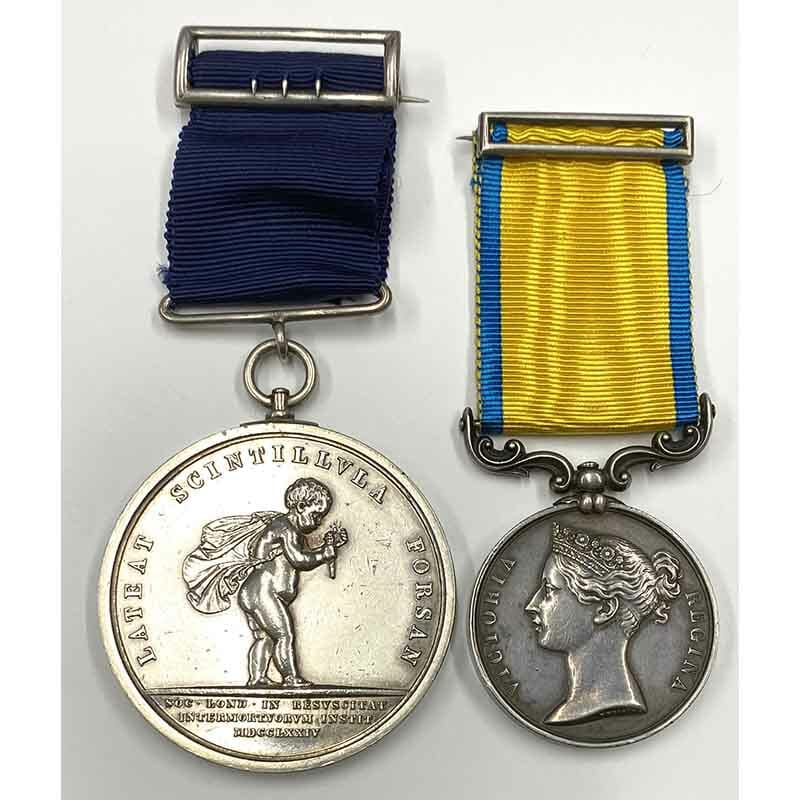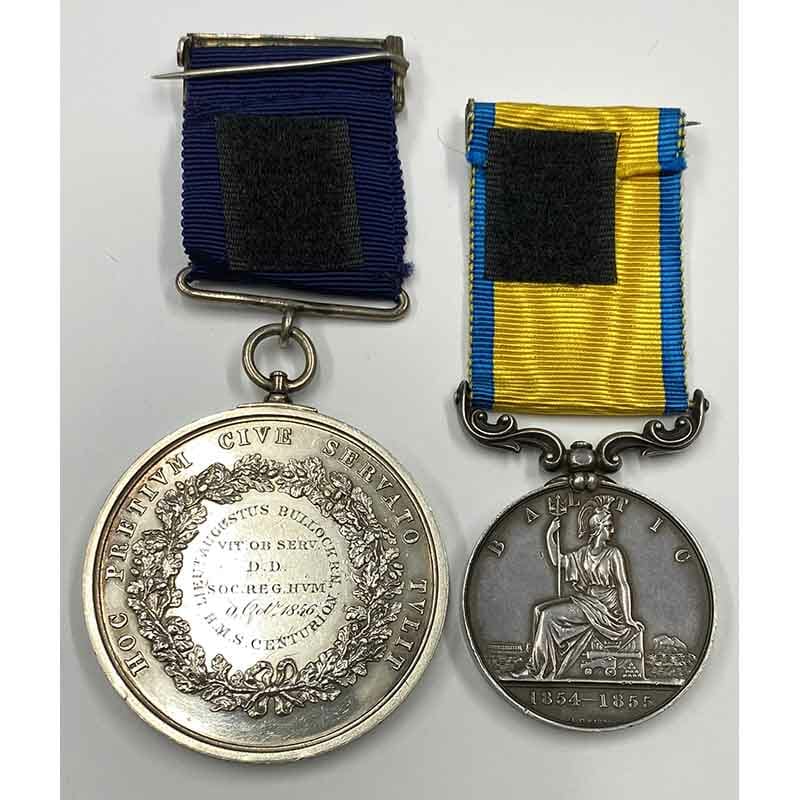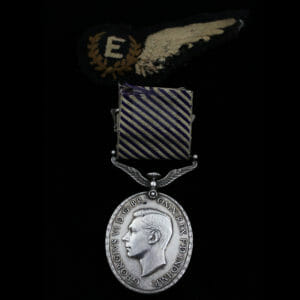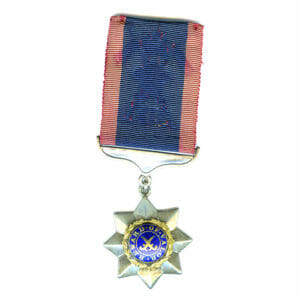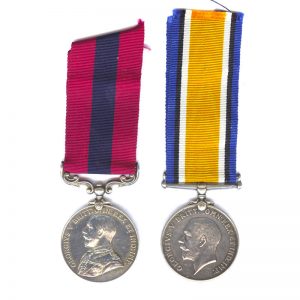Description
Baltic Medal 1854-5, unnamed as issued to Royal Navy with silver brooch bar, Royal Humane Society Large Silver Medal for saving life (Successful), Lieut August Bullock, Royal Navy, awarded for bravery in saving life during 1856.
The interesting story of Lieut Augustus Bullock, son of an Admiral and life saving specialist, noted many times for at a moments notice jumping overboard to save seamen’s lives, whilst also being court martialled numerous times for disrespectful language to his fellow and even commanding officers. His bad manners would later land him in a pub brawl during 1868 when he was brutally murdered.
Baltic Medal unnamed as issued.
Royal Humane Society Medal officially engraved: “Lieut Augustus Bullock, R.N., H.M.S. Centurion, vit ob serv. d.d. Soc. Reg. Hvm. 9 Octr. 1856”
Ex Dawson Collection, reference: Spink Exhibition No 9.
“On the 9th of October 1856, a seaman belonging to HMS Centurion, accidentally fell overboard, through the swamping of the cutter in the river Tagus, off Lisbon, when Lieut Augustus Bullock, who was in the wardroom at the time, and saw the man overboard passing astern of the ship, with his face downwards, and no apparent means of assistance near, immediately jumped overboard, taking with them barricoes, and helping to support him in the water from 25 to 30 minutes, until a boat came to their assistance, some delay being occasioned by the swamping of the cutter.”
Augustus Thomas John Bullock, was born in Woolwich on 7th October 1828, the son of Admiral Frederick Bullock R.N. (1788-1874) and Eliza McKie.
Naturally as the son of an Admiral he entered the service of the Royal Navy on 7th January 1843, becoming a Mate on 13th November 1849 at the age of 20.
Only 14 years old he was onboard HMS Camperdown when he was wounded in an explosion, Leicester Journal 21st July 1843:
“SHEERNESS- DREADFUL EXPLOSION ON BOARD THE CAMPERDOWN –
Last week, as the Camperdown was firing a parting salute to the King and Queen of the Belgians on their majesties passing the ship at Sea Ranch, a tremendous explosion of one of the portable magazines took place, by which Lieutenant Blackmoore, several Indies, and some seamen were wounded, the internal fittings knocked down and blown about, and the ship itself set on fire…….. Augustus Bullock, son of Captain F. Bullock, of her Majesty’s steam-vessel Tartarus, who is on board the Camperdown as a first-class Volunteer, escaped with a slight scar upon his head in a very miraculous way. He was close to the gun on the aft side of the bulkhead, and when the bulkhead was blown down he was buried under one of the panels, by which the whole force of the explosion passed over him; after the shock had gone off, he crawled out, and escaped the fire that was blazing around him.”
His rather incredible record of numerous life saving exploits is first noted during 1847 in the Canterbury Journal, 30th January 1847 when he dove into deep ice water:
“GALLANT AND INTREPID CONDUCT OF A MIDSHIPMAN, We have pleasure in recording an act of great intrepidity on the part of a young Midshipman, Mr Augustus Bullock, youngest son of Captain Bullock, of the Surveying Service, at present resident at Woolwich. While skating yesterday week, with a young companion, the ice broke, and the latter precipitated into deep water. While a dozen grown up persons stood by without attempting to give aid, young Bullock nobly went in after his friend, whom he succeeded in raising, and supported him till a ladder was pushed from the shore, and both were drawn safely to it.”
His sea service summary during his career:
HMS Terrible, Mate, 13th November 1849 – 7th September 1850
HMS Fisgard, Mate, 27th August 1851 – 5th September 1852. Promoted
HMS Fisgard, Navigating Lieut, 4th April 1853 – 8th March 1852.
HMS Lightning, 9th March 1854 – 21st June 1854
HMS Calcutta, 1st February 1855 – 3rd October 1855
HMS Centurion, 11th January 1856 – 28th February 1857.
HMS Meander, 31st December 1860 – 4th April 1864.
HMS Conqueror, 26th September 1864 – 22nd March 1865.
He quickly took an interest in life saving, and had in only 2 years sealed two patents.
The first was in the Journal of the Society of the Arts, Weekly List of Patents Sealed 19th March 1853: “146 Augustus Thomas John Bullock, Lieutenant Royal Navy, has given the like notice in respect of the invention of ‘improvements in taps and cocks.”
He then had another patent announced in the London Gazette 15th December 1854: “2558, To Augustus Thomas John Bullock, of Woolwich, in the county of Kent, Lieutenant in the Royal Navy, for the invention of ‘an improved raft or apparatus for saving life at sea.’
Serving as Surveying Officer Lieutenant in HMS Lightning from 7th March 1854. The ship at the time was serving in the Baltic Sea, during which time they captured the Russian Brig Patrioten on 15th April 1854 and was awarded Prize Money for the capture.
During Early June 1854 they also alongside the Driver surveyed Bomarsund, Aland Islands, in preparation for the attack.
A year later he joined HMS Dapper during March 1855 as Lieutenant Commander, as tender to Colossus.
The next year he was serving on HMS Centurion when he earned his medal for bravery, springing into action to save the life of a seaman.
“On the 9th of October 1856, a seaman belonging to HMS Centurion, accidentally fell overboard, through the swamping of the cutter in the river Tagus, off Lisbon, when Lieut Augustus Bullock, who was in the wardroom at the time, and saw the man overboard passing astern of the ship, with his face downwards, and no apparent means of assistance near, immediately jumped overboard, taking with them barricoes, and helping to support him in the water from 25 to 30 minutes, until a boat came to their assistance, some delay being occasioned by the swamping of the cutter.”
This was not his first instance of saving life, he was well known for fearlessly diving after seamen.
His service record also reads: “1st January 1862, Commodore Edmonstone reporting his very gallant conduct in jumping overboard and saving the life of a seaman, having previously saved many lives on similar occasions.”
However as a character, he was perhaps a bit too steadfast in his opinions bad mouthing his superior and fellow officers on multiple occasions, which would lead to his early death in 1868, this is first shown in 1855 when he was court martialled, being subject of a second court martial by 1857:
26th September 1855, Court Martial on HMS Calcutta.
“26th September 1855, severely reprimanded by Court Martial, and admonished to be more guarded for disrespectful language to the Commander of the Calcutta.
4th October 1855, Commander Stevens of Calcutta, again complaining of him for disrespect.”
Hampshire Chronicle, 29th September 1855:
“On Wednesday, a court martial was held on board the Victory, to try Lieut Augustus John Bullock, for behaving in a disrespectful and unofficer-like manner to Commander Stevens, of her Majesty’s ship Calcutta, by throwing his cap down when ordered by him to take it off, and saying that ‘Now he was obliged to do so he would.’ or words to that effect, and afterwards saying to the Commander Stevens, that he did not care for the Admiral or the Admiralty, and secondly, that he did on or about the 16th of August disobey the orders of the said Commander when ordered to his cabin, by not going there, but going to the ward-room, where he remained until removed by the Master-at-Arms.
Captain Sir T. Maitland, of the Excellent, presided, and the court, after hearing the evidence, found that the second charge had not been proved, and that the first charge had been in part proved, and that the first charge had been in part proved, inasmuch as he addressed Commander Stevens in an unofficer-like manner, and the court therefore adjudged the prisoner to be severely reprimanded, and admonished to be more careful in his conduct for the future.”
Addition: Less than 2 Months later Commander Stevens submited a new complaint for the same reason.
“Malta – A.T.J. Bullock, Court Martial, 10th March 1857, on board HMS Hibernia, of Lieutenant Bullock of HMS Centurion. Found guilty of using language unbecoming of an officer to another officer of the ship, Lieutenant Phillips. The two men had been on bad terms for some time and when Phillips tried to heal the rift by offering some wine, Bullock allegedly said ‘You are a D….d S…..g son of a b……h’
He was dismissed from his ship and placed at the bottom of the list of Lieutenants.”
His outburst can be assumed to have been “A damned sodding son of a bitch.”
One day whilst he was enjoying his retirement, he was having a classic British Pub Crawl, going from one public house to the next, drinking Beer and Gin, and reportedly treating whoever would drink with him.
He was having some drinks at Mr Chipperton’s Beer House, North End, Fulham when he had a disagreement with one James Brooks, aged 28, this led to a beer being thrown in his face, and being knocked out, Brooks then ran him over with his cart, killing him,
I am the wife of the last witness – on the 28th March last, I was at the Chipperton Beer-house, and saw the prisoner there, and a gentleman, who turns out to be Mr Bullock, they were standing against the door, and I saw the prisoner chuck the gentleman out of Mr Chipperton’s, and saw him fall out of the doorway with his head against the shutters, which were up – I did not see him rise again, and he never spoke, my husband was in the house, the prisoner got some beer and threw it into the gentleman’s face, and said “Take that, you sod!”, he gave the remainder of the beer to his wife in the cart outside, and said to her, “I will run over him and kill him”, he then took hold of the gentleman’s legs, and dropped him out into the road, I ran into tell Mr Chipperton he was going to kill him, and I saw no more, I afterwards saw the gentleman dead the hospital.
